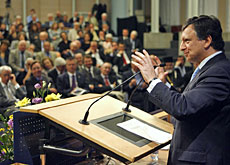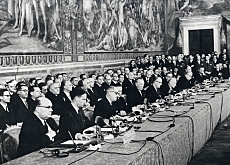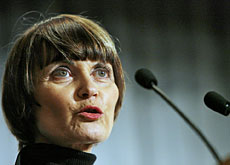Swiss told to “make an effort” in tax dispute

EU Commission President José Manuel Barroso has called on the Swiss government to do more in the ongoing spat over low corporate taxes in Switzerland.
He also said that while no pressure was being put on Switzerland to join the European Union, an isolated country had no political influence and no future in an age of globalisation.
However, the former Portuguese Prime Minister emphasised the “excellent” relations between the EU and Switzerland, pointing to Swiss voters’ approval in November of a SFr1 billion ($800 million) payment to the ten member states that joined the EU in May 2004.
“We are in good spirits, but we really think an effort is required on the part of the Swiss authorities,” Barroso said during a visit to the Jean Monnet Foundation for Europe at Lausanne University on Thursday.
The EU believes the low corporate taxes offered by cantons such as Obwalden and Zug violate a 1972 free trade agreement, calling it a disguised state subsidy.
The Swiss authorities have defended themselves, calling the accusation unfounded. The finance ministry has said no contractual regulations exist between Switzerland and the European Union on the harmonisation of company taxation.
It argues that neither the EU rules on competition, including those on state aid, nor the EU member states’ code of conduct on company taxation are applicable to Switzerland.
On Thursday Swiss Foreign Minister Micheline Calmy-Rey, who has previously called for Europe to show Switzerland more respect as a result of this issue, received support from Latvia, one of the countries she is visiting on a tour of northeastern Europe.
The Latvian prime minister and foreign minister both showed “understanding” for Switzerland’s position in the tax dispute, according to the Swiss foreign ministry.
In his speech given at the Baselworld watch show also on Thursday, Swiss Finance Minister Hans-Rudolf Merz said Switzerland “would not stand still” but would “develop its system autonomously – independently of external pressures”.
“Gallic village”
Barroso also said European cooperation was “more appropriate than ever” when coping with the great challenges of globalisation – whether it was energy, pollution of the environment or security.
He said a country all on its own would be “lost” when it came to economic competition and its political influence would be reduced to zero.
Regarding Switzerland, Barroso said the country was “more involved” in the European Union than some member states – “and also more dependent on Europe”, he added with a smile.
Swiss voters rejected membership of the European Economic Area in 1992 but Switzerland and the EU have negotiated a series of bilateral accords.
Barroso stressed however that no pressure was being put on Switzerland to become a member state. “We respect your decision completely,” he said, describing the Alpine nation as “a Gallic village – but without any Romans trying to conquer it”, referring to the French comic book series, The Adventures of Asterix.
swissinfo with agencies

More
EU bilateral accords
Switzerland’s competitive tax system has come under the scrutiny of the European Commission, which questions whether tax breaks attracting foreign companies contravene the 1972 free-trade agreement.
The EU’s code of conduct forbids member states from luring foreign companies with lower taxes than those offered to domestic firms. Non-EU member Switzerland has not signed this code.
Brussels is now playing the free-trade agreement card and calls the tax breaks state subsidies.
1972: Switzerland and the European Community sign a free-trade agreement.
1992: Bern lodges an application for membership of the European Union. In the same year, the people reject membership of the European Economic Area.
2002: the first package of bilateral agreements with the European Union comes into force.
2004: Bern and Brussels sign a second package of measures.

In compliance with the JTI standards
More: SWI swissinfo.ch certified by the Journalism Trust Initiative



You can find an overview of ongoing debates with our journalists here. Please join us!
If you want to start a conversation about a topic raised in this article or want to report factual errors, email us at english@swissinfo.ch.